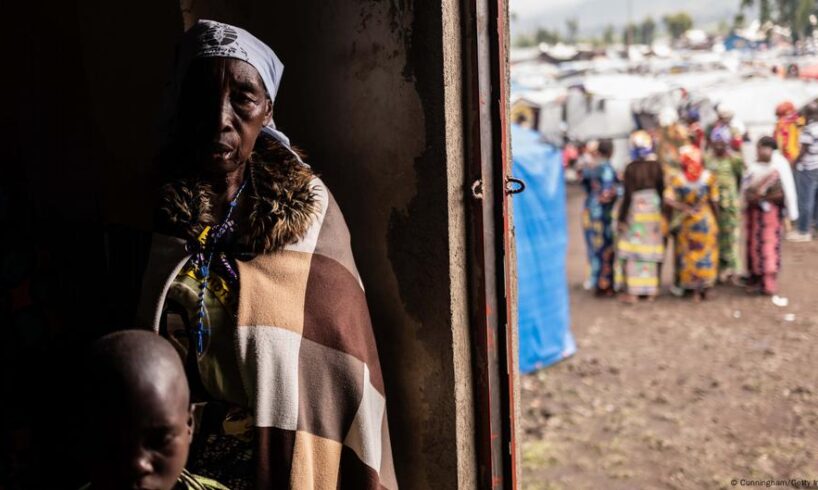
This will be a serious blow to aid organizations. “We are deeply concerned. And it will be felt by people in the Global South,” says Oliver Müller, head of Caritas International, which is involved in emergency and disaster relief worldwide.
Müller is appalled at the draft of the German federal budget for 2026, which the federal government approved on Wednesday, and which was subsequently presented by Federal Finance Minister Lars Klingbeil. According to the draft, the budget of the Federal Ministry for Economic Cooperation and Development will fall below the €10 billion ($11.4 bn) mark for the first time since 2018. The budget had already shrunk by almost €1 billion from 2024 to 2025.
What is equally alarming for Oliver Müller is that the Foreign Office’s budget for humanitarian emergency aid is set to be cut by more than half by 2026. There are several large projects that Caritas has been able to fund thanks to government money, “but these projects will be eliminated without replacement.”
How Germany’s cuts in foreign aid could cost lives
To view this video please enable JavaScript, and consider upgrading to a web browser that supports HTML5 video
Müller emphasizes that Caritas International will not be making across-the-board cuts. “There simply are humanitarian crises that we think are so serious and terrible that we will continue to use our own funds, donations, and church funds to provide assistance.”
As an example, Müller points to aid for internally displaced persons in the eastern Democratic Republic of Congo, “one of the greatest humanitarian disasters of our time.” There is now no more funding from the Foreign Ministry for this. “In the worst case, no one will provide any more help.” Currently, there is a trend to cut back on aid for the world’s poorest, says Müller, pointing to cuts made by the US, as well as the UK, Belgium, and other EU countries.
Germany’s credibility on the line
Other organizations widely criticized the German federal government’s planned cuts. VENRO, the umbrella organization for development cooperation and humanitarian aid organizations, warned Germany not to “shirk its responsibility.” Given the expected cuts, it said that it would no longer be possible to engage in strategic international cooperation. It accused the German federal government of overlooking the importance of the work done by the networks of professional organizations from civil society and those on the ground in providing emergency aid. The cuts are “absolutely incomprehensible,” according to a VENRO statement.
The day before the budget announcement, 17 aid organizations jointly accused the government of jeopardizing “not only life-saving measures, but also Germany’s strategic interests and international credibility.” Among those who signed the statement were Bread for the World, Welthungerhilfe, One, and Oxfam. A similar call had already been made in June by 30 organizations.
All of this means that the ministry headed by Reem Alabali Radovan, who has been in office since May, is losing its ability to make a difference. The declining importance of development policy is also evident when looking at the overall budget. The draft budget for 2026 provides for expenditures of €520.5 billion, around a third of which is currently still financed by new loans.
The finance minister explained that the aim was to ensure Germany’s future viability, stressing the growing importance of military readiness to counter Russia’s aggressive warfare. Without Russian President Vladimir Putin, this budget would look very different, said the SPD politician, who is also vice chancellor in the coalition government made up of Klingbeil’sSocial Democrats (SPD) and the Christian Democrats (CDU/CSU).
Of the planned total budget, €9.94 billion has been allocated to the the development aid ministry. That is just over 1.9% of the national budget. While this is not a catastrophic setback, it is a significant turning point. The largest percentage of the budget allocated to development aid was during Chancellor Angela Merkel’s administration in 2019, at 2.87 percent.
What the end of USAID means — Global Us
To view this video please enable JavaScript, and consider upgrading to a web browser that supports HTML5 video
Missing the international ODA target
The Official Development Assistance (ODA) ratio refers to the share of gross national income spent on development cooperation. In 2024, Germany’s ODA ratio was 0.67%. State Secretary for Finance Steffen Meyer is now predicting 0.52% for 2026 and 0.43% for 2029. This means Germany will fail to meet the international target of 0.7%.
Oliver Müller, head of Caritas International, emphasized that despite reduced funding, an independent ministry for development cooperation remains important. “If the ministry were not there, things would be even worse.” It is about shifting awareness to recognize that engagement in development policy and humanitarian emergency aid also serves global security and climate protection. “Ultimately, that also helps us in Germany.
This article was originally written in German.
While you’re here: Every Tuesday, DW editors round up what is happening in German politics and society. You can sign up here for the weekly email newsletter Berlin Briefing.





